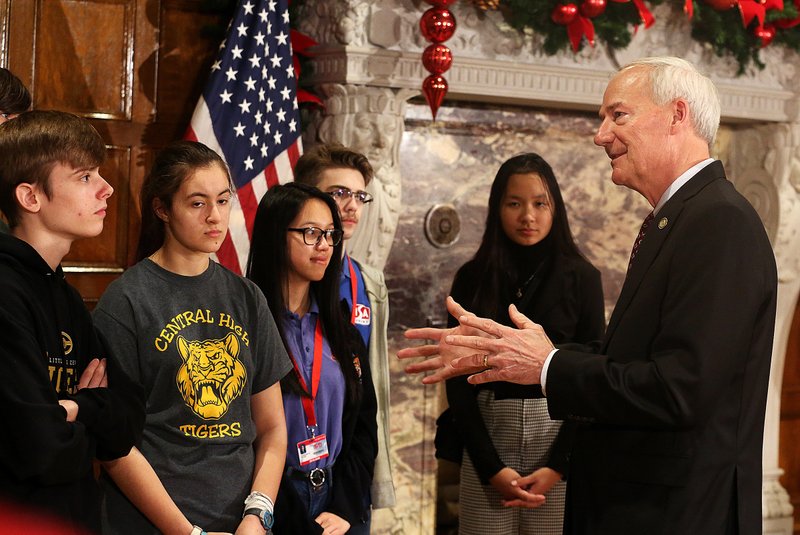Gov. Asa Hutchinson, in an executive order issued Friday, created a 25-member task force to steer state policy on computer science.
The State Computer Science and Cybersecurity Task Force will present a preliminary report in June and final report in November in advance of the 2021 legislative session.
Arkansas is generally perceived by the industry and other states as the leading state in computer science education, but the Republican governor said at a Friday news conference that the state couldn't get complacent.
"What is critical is we don't lose momentum," Hutchinson said. "So I'm asking this task force that will be composed of educators, private-sector technology companies, higher education, thought leaders in this area, to convene and make recommendations on the future of computer science, cybersecurity, data analytics for the future of Arkansas. This I consider a very important task force."
The Arkansas Department of Education announced last month that high school enrollment in computer science courses had increased for a sixth straight year to 9,813. The Natural State in 2015 was the first in the U.S. to require that all public high schools offer at least one computer science course.
The department also announced Friday that it had awarded $119,300 to 153 students and 20 schools in incentives for high scores on advanced placement exams last school year. That's up from $103,550 from the 2017-18 school year.
The task force builds off the Computer Science and Technology in Public School Task Force that the General Assembly created in 2015. Before that task force was dissolved at the end of 2016, it recommended computer science standards and changes to the state's computer science education framework.
The new task force, Hutchinson said, will offer guidance on long-term goals: industry pathways and certifications; alignment with college pathways; work-based learning opportunities; teacher credentialing; future funding needs; and focus on cybersecurity and data sciences.
Hutchinson also said that legislative recommendations shouldn't be the task force's main focus but at least a part of it. He said the group should also look at areas within computer science education where the state hasn't been successful.
He said the executive order shows that the issue is important to him.
Hutchinson has created about a dozen councils, commissions and other task forces through executive orders since taking office in 2015. Those groups have ranged from a task force created this year to examine the state's levee system to an advisory council on cycling created in 2016.
Michelle Cruz Arnold, executive director of global policy and external relations for College Board, the nonprofit group that administers advanced placement programs in Arkansas high schools, said leaders in other states constantly look to Arkansas when trying to improve their computer science education.
"Other states always ask: 'How can we be like Arkansas?'" Arnold said after presenting Hutchinson with an award for leadership in computer science education. "You hear that once and then you hear it 10 more times, so we thought we should thank the governor."
Arnold also said in an interview that Arkansas is the only state she is aware of that offers students financial incentives for performing well on advanced placement exams, on which a top score is a 5.
A student who scores a 3 receives $250; a student making a 4 receives $750; and a student scoring a 5 receives $1,000. Schools in Arkansas also receive between $50-$250 per student for scores between 3 and 5.
"Arkansas is incredibly unique in that regard," Arnold said.
The members of the governor's task force are:
• Allison Nicholas, Metova Inc., director of recruiting
• Ann Clemmer, Arkansas Department of Higher Education, senior associate director
• Anna Beth Gorman, Women's Foundation of Arkansas, executive director
• Anthony Owen, Arkansas Department of Education, state director of computer science
• Britt Cagnina, Elyxor, software engineer
• Bryan Hill, Ph.D., University of Arkansas, Fayetteville, dean of engineering and computer science
• Carl Frank, Arkansas' Computer Science Teachers Association, president
• Dave Wengel, iDatafy -- Little Rock, founder and CEO
• Dr. Allison Roberts, governor's office, education liaison
• Dr. Angela Kremers, Department of Career Education, director
• Dr. Charisse Childers, Department of Workforce Services, director
• Dr. Hung-Chi Su, Arkansas State University, chairman, Department of Computer Science, associate professor of computer science
• Dr. Sarah Moore, state Board of Education
• Dr. Stephen Addison, University of Central Arkansas, professor and dean of College of Natural Sciences and Mathematics
• Errin Stanger, Arkansas Regional Innovation Hub, deputy director
• Gopala Krishnan, DXC Technology
• James Hendren, Ph.D., technology startup consultant
• Jeston George, Apptegy, president/founder
• Joel Gordon, Steam Rocket Engine LLC, independent consultant
• John Ciesla, Greenwood School District, superintendent
• Karma Turner, Lake Hamilton School District, 2018-19 computer science educator of the year
• Lee Watson, Arkansas Cyber Alliance, founder
• Michael Armstrong, United Arkansas Credit Union, chief executive officer
• Mike Rogers, Tyson, senior supervisor HACCP (Hazard Analysis Critical Control Point)
• Phillip Young, Arch Ford Education Service Cooperative, director
• Susan Norton, Arkansas Academy of Computing, president
• Tom Chilton, Arkansas Economic Development Commission, director of technology development
• William Yoder, Arkansas Center for Data Sciences, executive director
• Yessica Jones, Division of Information Systems, director and state Chief Technology Officer
• Adam Holland, Walmart, eDiscovery and forensic services senior director II
• Marc Sternberg, Walton Family Foundation, K-12 education program director
Metro on 12/07/2019

